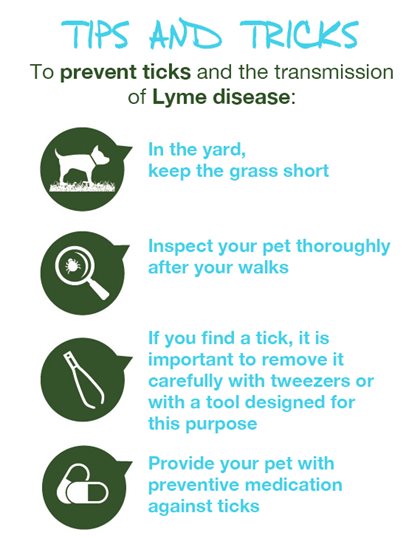WHY YOU SHOULD VACCINATE YOUR DOG AGAINST LYME DISEASE

Although only a small number of dogs exposed to the bacteria that cause Lyme disease develop symptoms, the veterinarians at Accès Vet recommend vaccination for dogs at risk. This is because repeated exposure to the bacteria transmitted by ticks can lead to potentially fatal kidney damage. For this reason, dogs who test positive for Lyme disease but show no clinical signs should still be vaccinated, as any future exposure to the bacteria could pose a serious risk.
WHY VACCINATE IF I PREVENTIVELY TREAT MY DOG AGAINST TICKS?
While preventive medication is highly effective and safe, it is not 100% foolproof. For the rare cases—about 1%—where a tick might still attach to your dog, vaccination offers an added layer of protection to prevent Lyme disease. As mentioned, ticks become active whenever the temperature exceeds 4°C. Vaccination ensures your dog is protected on warmer winter days when ticks are active, even if they are not receiving their regular preventive treatment.
WHY SHOULD MY DOG BE TESTED FOR LYME DISEASE?
A positive result from this test will indicate that your dog has been in contact with a tick carrying the bacteria that causes Lyme disease. Additional tests will be offered to determine if your dog should receive treatment for Lyme disease or if it is safe to wait to treat. You and those around you should also be particularly careful and do regular inspections of yourself, family members and your pets to quickly find a tick that has chosen you for its next meal! Finally, since future exposures to the bacteria increase the risk of developing Lyme disease, all dogs testing positive should receive good preventative treatment and be vaccinated.
Ticks are commonly found in rural areas and the countryside, favoring environments with long grass and brush, such as fields, wastelands, and forest edges. However, ticks are increasingly being spotted in urban and suburban areas as well. During winter, juvenile ticks remain dormant but become active again once temperatures reach 4°C. Additionally, some ticks may appear earlier in the spring, as they are transported by migratory birds arriving from southern regions.
If you visit areas where ticks are common, active prevention is strongly recommended. Preventive medications are typically given from April to December, depending on the region. Vaccination should also be considered if your pet regularly spends time in high-risk environments.
To ensure effective prevention, thoroughly inspect your pet after walks in these areas. If you find a tick, carefully remove it using tweezers or a tick removal tool available at your veterinarian's office. Grasp the tick as close to the skin as possible and pull it out straight without twisting. After removal, clean the area with a disinfectant, such as chlorhexidine, which can be purchased from your veterinarian or pharmacy.
There is a Lyme disease screening test that we recommend doing annually. This test is important because a positive result for Lyme disease suggests that you and your dog are in a risky environment. You should therefore be extra careful and seriously consider, if you have not already done so, appropriate prevention against ticks. You will also be much more attentive and vigilant in recognizing if symptoms of the disease appear.
In summary, effective tick control is recommended to prevent Lyme disease for both your and your dog. Depending on your lifestyle and the regions you visit, prevention could be very important. Talk to your veterinarian about the different prevention options.

PARASITE PREVENTION, NOT JUST A DOGS’ MATTER!
You don’t need to spend all day outdoors to risk exposure to parasites—a brief trip outside can be enough for your cat to become infected. Direct contact with another animal isn’t necessary either, as most parasites are transmitted through the environment. For example, fleas don’t jump directly from one cat to another; they travel through their surroundings. Of course, the risks are higher if your cat spends its time hunting or asserting dominance over the neighbors’ cats!
- Your cat can get fleas or ticks even if he goes outside wearing a harness.
- When hunting, your cat risks being contaminated by intestinal parasites including tapeworms.
- Cats can get ticks but are not susceptible to Lyme disease.
- The majority of cats with fleas do not scratch excessively. Only those who are allergic to flea saliva will experience significant itching.
- Fleas can transmit a blood parasite (hemobartenellosis) responsible for potentially fatal anemia for your cat.
- A cat that sniffs where there has been fecal matter can become contaminated with intestinal parasites which can be transmissible to humans.